Academy awards today announced the five nominees for the Best Foreign Language Film Award, “Amour” Austria, “Kon-Tiki” Norway, “No” Chile, “A Royal Affair” Denmark and “War Witch” Canada
Amour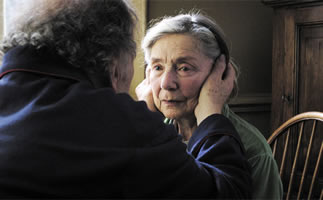 2012, Sony Pictures Classics, 127 min., France, Dir. Michael Haneke.
2012, Sony Pictures Classics, 127 min., France, Dir. Michael Haneke.
This heart-breaking look at love in the twilight of life won the Palme d’Or at this year’s Cannes Film Festival and was named best film of the year by Time magazine. The latest film from acclaimed writer-director Michael Haneke is the story of retired music teachers Anne (Emmanuelle Riva) and George (Jean-Louis Trintignant) who are living a quiet life in their Paris apartment when Anne suffers a stroke. Her condition deteriorates following surgery, and she exacts a promise from her husband not to send her to a nursing home – but the strain of caring for his wife mounts on George, and daughter Eva (Isabelle Huppert) is little help.
A Royal Affair
(EN KONGELIG AFFAERE)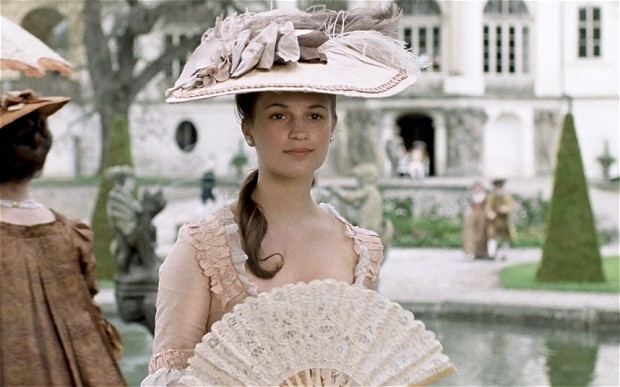
2012, Magnolia Pictures, 137 min., Denmark, Dir. Nikolaj Arcel.
Based on real events, this historical drama is set among the court of Denmark’s mentally ill King Christian VII in the late 1700s. As the King (Mikkel Folsgaard, a Best Actor winner at this year’s Berlin Film Festival) grows further removed from reality, his physician Johann Friedrich Struensee (CASINO ROYALE villain Mads Mikkelsen) exerts increasing influence over the monarch. While Struensee’s support of progressive policies is a boon to the country, his romantic interest in the Queen (Alicia Vikander) is more problematic.
Kon-Tiki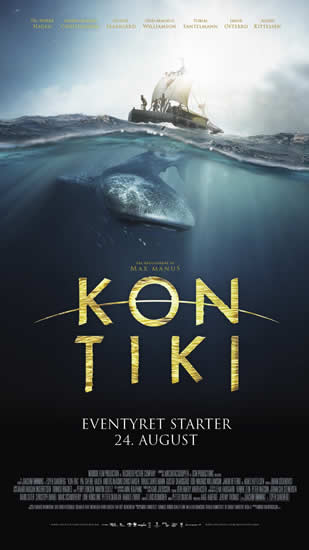 2012, Nordisk Fil Distribution, 118 min., Norway, Dirs. Joachim Ronning, Espen Sandberg.
2012, Nordisk Fil Distribution, 118 min., Norway, Dirs. Joachim Ronning, Espen Sandberg.
Norway’s grandest production to date translates Thor Heyerdahl’s intrepid 1947 journey across the Pacific on a primitive raft into a larger-than-life, visually dazzling epic. Ethnographer Thor (Pal Sver Haggen, about whom The Hollywood Reporter writes “has something of the young Peter O’Toole about him, evincing charisma and madness nearly in equal measure”), along with a motley crew, assembles a raft inspired by the pre-Colombian Incas as a means of proving his theory that the Polynesian islands were settled by South Americans crossing the Pacific. What follows is the Peru-to-Polynesia excursion, which co-directors Joachim Ronning and Espen Sandberg and a crew of hundreds fill with first-rate adventure, high-seas gravitas and nail-biting suspense, set against majestic cinematography.
No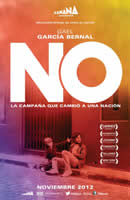 No is a 2012 Chilean film directed by Pablo Larraín. Mexican actor Gael Garcia Bernal plays René, an in-demand advertising man working in Chile in the late 1980s. The film is based on the play El Plebiscito, written by Antonio Skármeta. The historical moment the film captures is when advertising tactics came to be widely used in political campaigns. The campaign in question was the historic 1988 plebiscite of the Chilean citizenry over whether or not to accept a continuation of Pinochet’s dictatorship.
No is a 2012 Chilean film directed by Pablo Larraín. Mexican actor Gael Garcia Bernal plays René, an in-demand advertising man working in Chile in the late 1980s. The film is based on the play El Plebiscito, written by Antonio Skármeta. The historical moment the film captures is when advertising tactics came to be widely used in political campaigns. The campaign in question was the historic 1988 plebiscite of the Chilean citizenry over whether or not to accept a continuation of Pinochet’s dictatorship.
After fifteen years of military rule, the public are being asked to vote in the national plebiscite of 1988 on whether General Augusto Pinochet should stay in power. René works as part of a team to create upbeat films and promotional material, in the hope it will encourage the Chilean public to vote ‘No’ to Pinochet leading the nation for another eight years. Meanwhile the boss of his advertising agency is busy working on the ‘Yes’ campaign. The campaign consisted in 27 nights of television advertisements, in which each side had 15 minutes to present their point of view.[2]
War Witch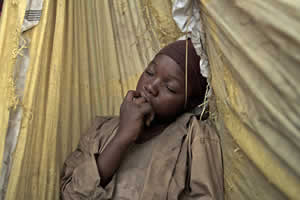 Director: Kim Nguyen
Director: Kim Nguyen
Komona (Rachel Mwanza, in an astonishing debut) is only 12 years old when she is kidnapped by rebel soldiers and thrown into a horrific life of guerilla warfare. Forced to witness and commit unspeakable acts of brutality, she forms a protective friendship with a young boy in the group, an albino she calls “Magician.” Meanwhile the soldiers attribute her uncanny survival skills to witchcraft. When the two friends escape the rebels’ clutches, it seems possible they can resume a normal life, but the world they live in is one where cruelty and terror reign, and their freedom is short lived.
Shot in the Democratic Republic of the Congo, War Witch takes place in an unnamed African country, ravaged by war and controlled by armed militia. Subtle, personal touches, and the spontaneity and depth of Mwanza’s enthralling performance prevent the story from becoming overly sensational or exploitative; there are fleeting moments of vibrancy, joy and wonder too, lending the film an air of magic realism. An extraordinary, humane and deeply affecting testament to the strength of human resilience in the darkest of times, War Witch has deservedly garnered awards around the world.

